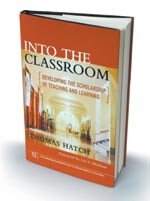
It would be unthinkable for scientists to have only limited access to the work of their colleagues. If they couldn’t exchange ideas and discoveries, the advance of scientific knowledge would grind to a halt. But that’s generally the situation faced by teachers, often isolated from each other by both the physical layout of schools and their hectic daily schedules.
In this trim little book, Hatch argues that teachers should also be scholars. While most scholarship on teaching and learning is now conducted by researchers from foundations or universities, educators have the ability—and perhaps the responsibility—to investigate their own practice.
A former codirector at the Carnegie Academy for the Scholarship of Teaching and Learning, Hatch draws on his work with K-12 teachers who served as academy fellows to illustrate how this might be done. The fellows, he says, recognized problems in their methodology, tried and documented different strategies to overcome them, and then shared their findings, whether in hallway conversations or more formally through conference papers and published articles. One of the fellows, Sarah Capitelli, a 1st grade teacher from the San Francisco area, not only improved her own teaching, but also inspired a major change in her school’s struggling bilingual education program.
Although the “scholarship of teaching and learning” may be full of promise, Hatch admits that it remains, for the most part, a “fantasy.” In the current climate of accountability, teachers aren’t seen as “passionate and committed intellectuals” whose expertise can be a critical resource, but as “line workers who must be monitored and controlled.” This is unfortunate. Denying the value of their experiences is like never digging for a treasure buried in your own backyard.


